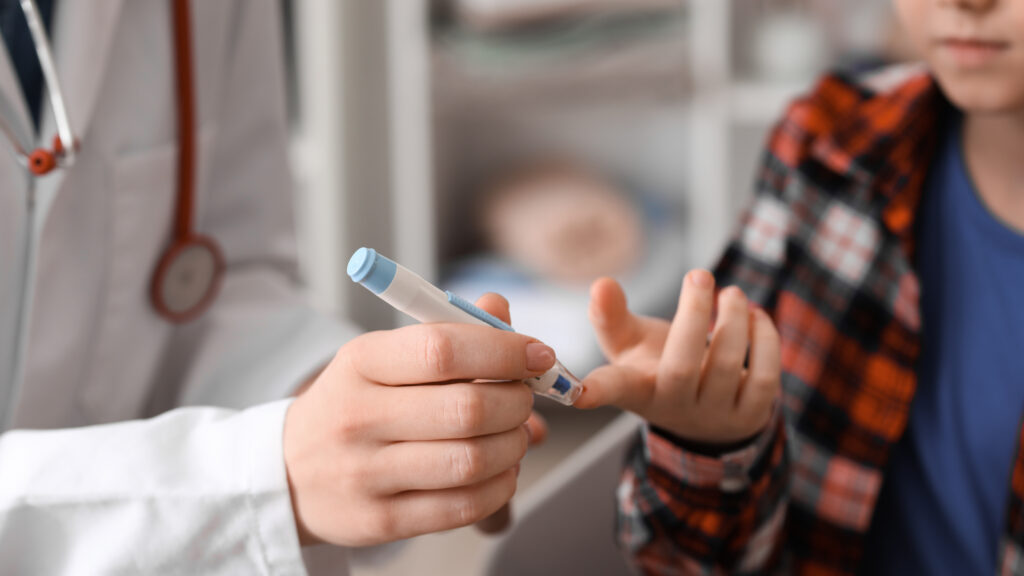It may be time to add Covid-19 infection to the list of possible risk factors for developing type 2 diabetes at a young age.
An observational study published Monday in JAMA Network Open found that children and adolescents were one-and-a-half times more likely to be diagnosed with the metabolic disorder in the months after having Covid-19 compared to similar kids who weathered other respiratory infections. Children with obesity were twice as likely to have new type 2 diabetes post-Covid and those who were sick enough to be hospitalized were almost three times as likely to do so.
advertisement
The absolute risk of type 2 being diagnosed in any child remained well under one percentage point. But the increased risk was considered significant: Of the 306,801 children studied, 398 in the Covid group received a type 2 diagnosis, compared to 252 who had not had Covid.
“While this doesn’t mean every child who gets Covid-19 will develop diabetes, it highlights the need for awareness,” said Soumya Adhikari, a pediatric endocrinologist at UT Southwestern Medical Center, who was not involved in the study. “For parents, this means keeping a closer eye on their child’s health after recovering from Covid-19, especially if their child has risk factors like being overweight or if they were hospitalized during the illness.”
There’s a long history connecting infections in young children to type 1 diabetes, explained by an immune system responding so strongly to a virus or other threat that it turns its friendly fire on the body. This autoimmune reaction destroys the pancreatic islet cells that secrete insulin. In type 2 diabetes, the far more common version of the disease, insulin resistance arises, which means the body isn’t as responsive to the insulin it makes.
advertisement
Since the Covid-19 pandemic emerged, clinicians and scientists have been watching rates of type 1 diabetes rise, suspecting the virus may be a main driver. Monday’s study can’t show cause and effect, but the research follows a 2022 CDC report showing increased risk for both types of diabetes in 10- to 18-year olds.
“The increased diabetes risk among persons aged <18 years following COVID-19 highlights the importance of Covid-19 prevention strategies in this age group, including vaccination for all eligible persons and chronic disease prevention and treatment,” the CDC authors wrote.
A diagnosis of type 2 diabetes means a doubling of medical costs per year, study author Pauline Terebuh told STAT in an interview. “Then they have to live with the complications on an ongoing basis. So if they’re diagnosed early during youth, they’re going to carry that burden for a long time.”
Terebuh’s team at Case Western Reserve University School of Medicine looked only for type 2 diagnoses after Covid in more than 600,000 electronic health records from January 2020 through December 2022.
“With the rise of Covid, we’ve been very concerned not only about what happens acutely with Covid, but then what the potential sequelae or burden of disease is after that,” said Terebuh, an internal medicine and preventive medicine physician as well as an epidemiologist. “Type 2 is unfortunately increasing in young kids and then there were a couple of studies that showed that during the first year of the pandemic, it increased even more. But lots of things changed for kids during the pandemic.”
Young people were more sedentary, their access to food varied, their stress changed.
Still, the researchers wondered if the SARS-CoV-2 virus was having a direct impact on the insulin-producing cells, pushing people already at risk from obesity, for example, a little more quickly toward diabetes type 2. Metabolic stress might be at play, too. When someone has a severe Covid infection, the inflammatory process the body goes through can advance progression toward a chronic illness like diabetes.
advertisement
UT Southwestern’s Adhikari said that in the early months of the pandemic, his practice was less concerned about numbers than the fact that children being diagnosed with diabetes with or without Covid appeared much sicker than prior to Covid — a finding confirmed in the literature. As for the current study, “although the relative risk is appreciable, thankfully the absolute risk conveyed by an individual Covid infection seems small.”
He advises parents to watch for signs of diabetes — increased thirst, frequent urination, or unexplained weight loss — and if they see them, talk to their pediatrician as soon as possible. “Early detection is key, and regular follow-ups with healthcare providers are crucial for kids who’ve had Covid-19, particularly if they’re already at higher risk,” Adhikari told STAT in an email. “This study doesn’t imply that Covid-19 causes diabetes in every case, but it does suggest that the virus might trigger diabetes in some children, especially those who are already susceptible.”
The Case Western scientists said their study did not include sufficient data on vaccination to say what role that might play in managing risk. Adhikari said he was impressed by the large number of health records examined, but cautioned that those records can carry miscoding errors. He also wished there was some way to account for steroid use. Commonplace in treating Covid, it’s also a known risk factor for at least transient hyperglycemia, and could be recorded as diabetes.
“We certainly don’t understand everything about the interplay between Covid-19 infection and its downstream effects on blood sugar control, much less frank diabetes development,” he said. “Practically speaking, today it’s probably almost more relevant to ask whether repeated infections confer increased risk beyond the initial infection, given how many people have been exposed to the virus as of today. We understand even less about that.”
Terebuh also emphasized the importance of further research.
advertisement
“This is very important for follow-up because now Covid is endemic,” Terebuh said. “We’re not thinking about it as much, but it’s not gone.”
STAT’s coverage of chronic health issues is supported by a grant from Bloomberg Philanthropies. Our financial supporters are not involved in any decisions about our journalism.

